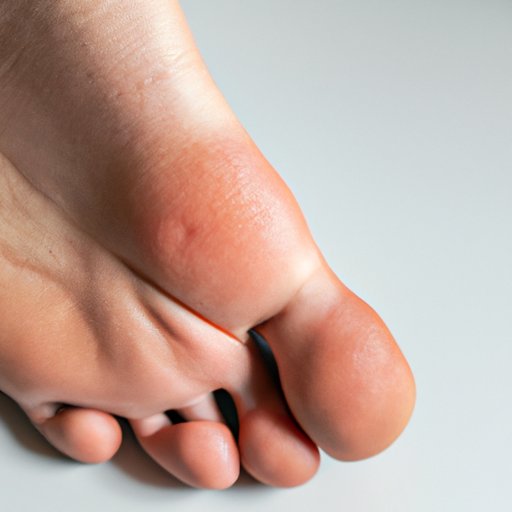
Introduction
Plantar warts are a contagious and sometimes painful skin condition that affect the feet. They are caused by the human papillomavirus (HPV) and can be difficult to treat. In this article, we will explore the causes, treatment options, and prevention techniques for plantar warts. We will also discuss effective home remedies for those who prefer a natural approach to healing.
Understanding Plantar Warts
Plantar warts are non-cancerous skin growths that appear on the soles of the feet. They can be identified by their rough texture and black dots caused by blood vessels that have grown into the wart. Plantar warts are caused by a viral infection in the outer layer of skin in the sole of the feet. The virus is commonly found in warm and moist environments such as public showers, swimming pools, and locker rooms. Plantar warts can be spread through direct or indirect contact with the virus.
Risk factors for developing plantar warts include walking barefoot in public places, compromised immune systems, and a history of previous warts. Children and teenagers are more susceptible to developing plantar warts than adults.
Treatment Options
There are several treatment options available for plantar warts including pharmaceutical interventions and over-the-counter treatments. The most common pharmaceutical intervention involves the use of freezing or burning to remove the wart. This should be done by a medical professional.
Over-the-counter treatments typically involve the use of salicylic acid to dissolve the wart. These treatments can take several weeks to work and may cause skin irritation or damage to healthy skin surrounding the wart.
It is important to seek medical advice before treating a plantar wart, especially if it is painful, bleeding, or spreading to other parts of the foot.
Effective Home Remedies
Many people prefer to use home remedies to treat plantar warts. It is important to note that these remedies have not been scientifically proven, but many people find them effective.
One popular home remedy is to soak the wart in apple cider vinegar for up to 20 minutes a day. The acetic acid in the vinegar is believed to help dissolve the wart. Duct tape is another common home remedy. Simply cover the wart with duct tape for several days, then remove the tape and soak the wart in warm water before using a pumice stone to gently remove the dead skin. Tea tree oil is another effective home remedy for plantar warts. Apply a drop of tea tree oil to the wart daily until it disappears.
It is important to properly administer these home remedies and monitor the wart for any adverse reactions or worsening symptoms. It is also important to note that home remedies may take longer to work than pharmaceutical interventions.
Preventing Plantar Warts
Preventing plantar warts involves maintaining good hygiene and avoiding barefoot contact with potentially contaminated surfaces. Wear shoes or sandals in public showers, locker rooms, and swimming pools. Keep your feet clean and dry, especially if you have previously had a plantar wart.
What to Do When Treatments Do Not Work
If over-the-counter treatments or home remedies do not work, it is important to seek medical advice. A doctor may recommend stronger pharmaceutical interventions such as injection therapy or laser treatment. These treatments should only be administered by a medical professional.
Spotting the Differences
It is important to accurately diagnose a plantar wart to effectively treat it and prevent it from spreading. Plantar warts should not be confused with other types of foot lesions such as calluses or corns. Plantar warts typically have small black dots caused by blood vessels that have grown into the wart. If you are unsure whether you have a plantar wart, seek medical advice.
Conclusion
Plantar warts can be a frustrating and painful condition to deal with, but there are several treatment options available. Pharmaceuticals interventions, over-the-counter treatments, and home remedies can all be effective in treating plantar warts. It is important to seek medical advice if your wart is painful, bleeding, or spreading. Additionally, good hygiene and prevention techniques can reduce the risk of developing plantar warts in the future.





